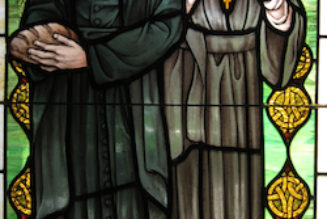 Seeking not to leave behind Pentecost so soon, I propose here to briefly consider the sequence hymn for Pentecost and the purpose and history of such hymns in the liturgy. There are several feasts of the Church during which a “sequence” hymn may be sung. The sequence hymn is sung just before the Alleluia (Gospel Acclamation). The feasts with sequence hymns are these:
Seeking not to leave behind Pentecost so soon, I propose here to briefly consider the sequence hymn for Pentecost and the purpose and history of such hymns in the liturgy. There are several feasts of the Church during which a “sequence” hymn may be sung. The sequence hymn is sung just before the Alleluia (Gospel Acclamation). The feasts with sequence hymns are these:
- Easter – Victimae Paschali Laudes (To the Paschal Victim give praise)
- Pentecost – Veni Sancte Spiritus (Come, Holy Spirit)
- Corpus Christi – Lauda Sion (Praise O Sion)
- Our Lady of Sorrows – Stabat Mater (Stood the Mother, sad and weeping)
- All Souls – Dies Irae (Day of Wrath)
Too many parishes simply omit the sequence hymns. But for my money, they ought to be sung, especially if it occurs on a Sunday. (I will admit, though, that the Lauda Sion is rather long.)
Most sequence hymns were written in the Middle ages and were sung just before the Gospel as the clergy processed to the place of Gospel. Sometimes, particularly in larger churches, the Gospel was chanted midway down the nave so that it could be heard, and these sequence hymns helped to fill up the time of that procession. Many important feasts of the Church began to have these sequence hymns composed for them during the period of the 11th through 13th centuries.
However, after the Council of Trent, in the Missal of Pius V (published in 1570), there were only four sequence: Victimae paschali laudes sung at Easter, Veni Sancte Spiritus for Pentecost, Lauda Sion Salvatorem sung at Corpus Christi, and the Dies Irae for All Souls and in Masses for the Dead. In the 1700s, Stabat Mater for the feast of Our Lady of Sorrows was added. Much later (in the early 1970s) the Dies Irae was removed from the Requiem Mass of the revised Roman Missal and restored in the Liturgy of the Hours as an Advent hymn, which it originally was. It may, however, still be sung on the Feast of All Souls.
Let’s look at the sequence hymn for Pentecost (Veni Sancte Spiritus) in a little more detail.
The hymn was likely written by Pope Innocent III (1161-1216). Written in Trachaic dimeter (catalectic), it is widely regarded as one of the masterpieces of sacred Latin poetry. It was obviously written by someone who had experienced many sorrows, but also consolation in those sorrows. The rhyme in this hymn is quite rich and complex. The first and second lines always rhyme, and the third line of every verse ends in “ium.”
The sung version of this hymn is gorgeous and soaring. It starts subtly and builds through the center with soaring notes; then it sets us down gently at the end.
My favorite verses speak of the moderation that the Spirit offers:
In labor rest,
in the heat, moderation;
in tears, solace.
Make flexible that which is rigid,
Warm that which is cold,
Rule that which is deviant.
Here is the Latin text along with a (fairly literal) translation of my own:
| VENI, Sancte Spiritus, et emitte caelitus lucis tuae radium. |
COME, Holy Spirit, send forth from heaven the rays of thy light |
| Veni, pater pauperum, veni, dator munerum veni, lumen cordium. |
Come, Father of the poor, Come, giver of gifts, Come, light of our hearts. |
| Consolator optime, dulcis hospes animae, dulce refrigerium. |
Oh best Comforter, Sweet guest of the soul, Sweet refreshment. |
| In labore requies, in aestu temperies, in fletu solatium. |
In labor rest, in the heat, moderation, in tears, solace. |
| O lux beatissima, reple cordis intima tuorum fidelium. |
O most blessed light, fill the inmost heart of thy faithful. |
| Sine tuo numine, nihil est in homine, nihil est innoxium. |
Without your spirit, nothing is in man, nothing that is harmless |
| Lava quod est sordidum, riga quod est aridum, sana quod est saucium. |
Wash that which is sordid water that which is dry, heal that which is wounded. |
| Flecte quod est rigidum, fove quod est frigidum, rege quod est devium. |
Make flexible that which is rigid, warm that which is cold, rule that which is deviant. |
| Da tuis fidelibus, in te confidentibus, sacrum septenarium. |
Give to thy faithful, who trust in thee, the sevenfold gifts. |
| Da virtutis meritum, da salutis exitum, da perenne gaudium, Amen, Alleluia. |
Grant to us the merit of virtue, grant salvation at our going forth, grant eternal joy. Amen, Alleluia. |
Here is the traditional Gregorian Chant of this sequence. Enjoy this little masterpiece!
[embedded content]
And here is another version—modern, but nice:
Join Our Telegram Group : Salvation & Prosperity








